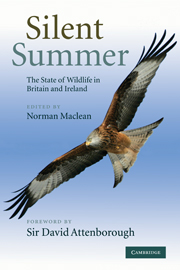Book contents
- Frontmatter
- Contents
- List of contributors
- Foreword
- Preface
- Acknowledgements
- List of abbreviations
- 1 Introduction
- PART I FACTORS DRIVING CHANGES IN WILDLIFE
- PART II CONSERVATION IN ACTION
- PART III THE CASE HISTORIES
- 15 Mammals in the twentieth century
- 16 Bats
- 17 State of bird populations in Britain and Ireland
- 18 The conservation of the Grey Partridge
- 19 Reptiles
- 20 Amphibians
- 21 Freshwater fishes: a declining resource
- 22 Riverflies
- 23 Bumblebees
- 24 Butterflies
- 25 Moths
- 26 Dragonflies (Odonata) in Britain and Ireland
- 27 Flies, beetles and bees, wasps and ants (Diptera, Coleoptera and aculeate Hymenoptera)
- 28 Hemiptera
- 29 Grasshoppers, crickets and allied insects
- 30 Aerial insect biomass: trends from long-term monitoring
- 31 Other invertebrates
- 32 Land and freshwater molluscs
- 33 The seashore
- 34 The offshore waters
- 35 Plants
- 36 Conclusion: what is the likely future for the wildlife in Britain and Ireland?
- Glossary
- Name index
- Subject index
- Plate section
- References
20 - Amphibians
Published online by Cambridge University Press: 05 August 2012
- Frontmatter
- Contents
- List of contributors
- Foreword
- Preface
- Acknowledgements
- List of abbreviations
- 1 Introduction
- PART I FACTORS DRIVING CHANGES IN WILDLIFE
- PART II CONSERVATION IN ACTION
- PART III THE CASE HISTORIES
- 15 Mammals in the twentieth century
- 16 Bats
- 17 State of bird populations in Britain and Ireland
- 18 The conservation of the Grey Partridge
- 19 Reptiles
- 20 Amphibians
- 21 Freshwater fishes: a declining resource
- 22 Riverflies
- 23 Bumblebees
- 24 Butterflies
- 25 Moths
- 26 Dragonflies (Odonata) in Britain and Ireland
- 27 Flies, beetles and bees, wasps and ants (Diptera, Coleoptera and aculeate Hymenoptera)
- 28 Hemiptera
- 29 Grasshoppers, crickets and allied insects
- 30 Aerial insect biomass: trends from long-term monitoring
- 31 Other invertebrates
- 32 Land and freshwater molluscs
- 33 The seashore
- 34 The offshore waters
- 35 Plants
- 36 Conclusion: what is the likely future for the wildlife in Britain and Ireland?
- Glossary
- Name index
- Subject index
- Plate section
- References
Summary
Summary
Great Britain and Ireland have a very small amphibian fauna compared with many parts of the world, especially the tropics. In this chapter, I consider the current status of our seven native species in the context of the global amphibian decline phenomenon, asking to what extent our amphibian fauna is vulnerable to the same threatening processes as amphibians elsewhere in the world. Detailed studies of the impact of various threats on Britain's amphibians are few in number and so the level of threat must be inferred from studies carried out elsewhere, particularly in the USA. All of our seven native species also occur widely in western Europe and I draw extensively on the results of research from other European countries to infer the level of risk.
Biodiversity on planet Earth is undergoing a mass extinction event, the sixth during the history of life on Earth. Amphibians, which survived the previous four mass extinction events better than many animal groups (they did not exist during the first), are among the most severely affected by this current event (Wake and Vredenburg 2008). The global amphibian decline phenomenon, first noted in 1989, has since been the subject of intensive research (Alford and Richards 1999; Halliday 2007). A recent global assessment of the world's known amphibian species (currently numbering 6453 and increasing rapidly, due to the discovery of new species) concluded that around a third of amphibian species are threatened with extinction and that an estimated 168 amphibian species have become extinct in the last four decades (Stuart et al. 2004).
- Type
- Chapter
- Information
- Silent SummerThe State of Wildlife in Britain and Ireland, pp. 363 - 382Publisher: Cambridge University PressPrint publication year: 2010



